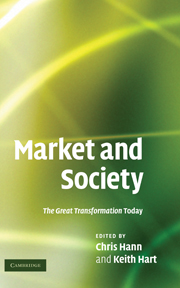Book contents
- Frontmatter
- Contents
- List of figures and table
- List of contributors
- 1 Introduction: Learning from Polanyi 1
- 2 Necessity or contingency: Mutuality and market
- 3 The great transformation of embeddedness: Karl Polanyi and the new economic sociology
- 4 The critique of the economic point of view: Karl Polanyi and the Durkheimians
- 5 Toward an alternative economy: Reconsidering the market, money, and value
- 6 Money in the making of world society
- 7 Debt, violence, and impersonal markets: Polanyian meditations
- 8 Whatever happened to householding?
- 9 Contesting The Great Transformation: Work in comparative perspective
- 10 “Sociological Marxism” in central India: Polanyi, Gramsci, and the case of the unions
- 11 Composites, fictions, and risk: toward an ethnography of price
- 12 Illusions of freedom: Polanyi and the third sector
- 13 Market and economy in environmental conservation in Jamaica
- 14 Embedded socialism? Land, labor, and money in eastern Xinjiang
- 15 Afterword: Learning from Polanyi 2
- Bibliography
- Index
8 - Whatever happened to householding?
Published online by Cambridge University Press: 08 August 2009
- Frontmatter
- Contents
- List of figures and table
- List of contributors
- 1 Introduction: Learning from Polanyi 1
- 2 Necessity or contingency: Mutuality and market
- 3 The great transformation of embeddedness: Karl Polanyi and the new economic sociology
- 4 The critique of the economic point of view: Karl Polanyi and the Durkheimians
- 5 Toward an alternative economy: Reconsidering the market, money, and value
- 6 Money in the making of world society
- 7 Debt, violence, and impersonal markets: Polanyian meditations
- 8 Whatever happened to householding?
- 9 Contesting The Great Transformation: Work in comparative perspective
- 10 “Sociological Marxism” in central India: Polanyi, Gramsci, and the case of the unions
- 11 Composites, fictions, and risk: toward an ethnography of price
- 12 Illusions of freedom: Polanyi and the third sector
- 13 Market and economy in environmental conservation in Jamaica
- 14 Embedded socialism? Land, labor, and money in eastern Xinjiang
- 15 Afterword: Learning from Polanyi 2
- Bibliography
- Index
Summary
Introduction
Polanyi's contribution to the history of economic thought is not so much as a theorist of value but as a conceptual tool-maker and tool-user. “The study of the shifting place occupied by the economy in society,” he noted (Polanyi 1957b: 250), is “no other than the study of the manner in which the economic process is instituted at different times and places. This requires a special tool box.” Polanyi the “tool-user” is the historian, the author of The Great Transformation (1944), his classic study of the “shifting place” occupied by the economy in nineteenth-century England. Polanyi the “tool-maker” is the concept-builder who fills his toolbox with general concepts gathered from single-case studies, refines them with logical distinctions of the sharpest kind, and orders them neatly in the rows and columns of his conceptual tool-box.
We first meet Polanyi the tool-maker in Chapter 4 of The Great Transformation where his four general principles of behavior – reciprocity, redistribution, householding, and money-making – are distinguished by social relationships and institutional pattern. His concept of “reciprocity,” a process embedded in family and kinship, and instituted by symmetrically arranged groupings, was inspired by Thurnwald's (1916) ethnographic study of dual organization among the Banaro of Papua New Guinea; his concept of redistribution was inspired by Malinowski's (1922) study of the Trobriand Islands; and his concept of householding – “the etymon of the word ‘economy’” (Polanyi 2001: 55) – comes from Aristotle.
- Type
- Chapter
- Information
- Market and SocietyThe Great Transformation Today, pp. 133 - 159Publisher: Cambridge University PressPrint publication year: 2009
- 36
- Cited by

